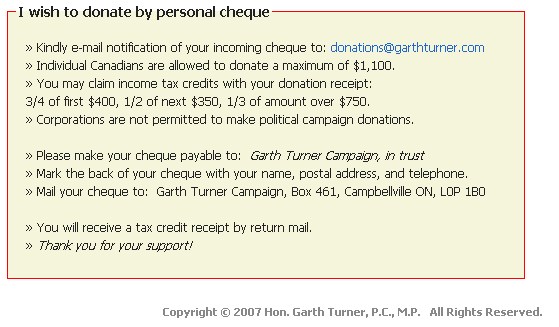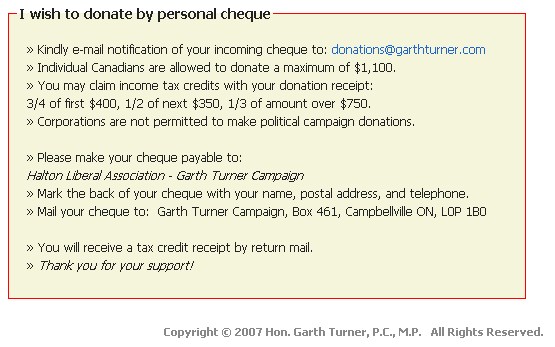The Liberals have been trying to make gains from the so-called “In and Out scandal” in which they allege impropriety in the transfers of money from local Conservative election campaigns to the federal campaign for the purposes of funding national advertising.
Transfers of money from local to federal campaigns is of course legal as all parties do this (there is even a category for it on Elections Canada returns that all candidates, EDAs and political parties must file). Indeed, the Conservatives and the Liberals have a different tradition here: The Conservatives send their EDAs 10% of all the money the national party raises, and the Liberals tax their EDAs 40 some percent of their candidate’s Elections Canada refund. However, it is the channeling of local cash to the federal party to pay for advertising where the Liberals see red in the Tories’ blue campaign.
One of the most vocal critics of this alleged scheme has been Liberal MP Marlene Jennings of Notre-Dame-de-Grâce–Lachine. Here is a quote of hers from the House of Commons:
Mr. Speaker, the in-and-out financing scandal implicates at least six Conservative ministers, like the public safety minister and the foreign affairs minister. Their response? Dead silence.
The member for West Vancouver–Sunshine Coast–Sea to Sky Country [Blair Wilson] did the right thing. At the very first hint of any questions about his campaign he stepped aside so he could clear his name.
The independent investigation into the Conservative scheme has not been completed. Will the government demonstrate true leadership and demand resignations from its six ministers?
Let’s take a closer look at Jennings’ 2004 and 2006 Elections Canada filing:
and 2006:
Jennings’ 2004 election return shows a $300 expense for advertising paid to the Liberal Party of Canada and a $1500 expense for the same paid to “The Federal Liberal Agency of Canada”. The 2006 return shows a $11,206.86 expense for advertising paid to the Quebec wing of the federal Liberal Party.
The Liberals have alleged impropriety in the Conservative practice of transferring money from local campaigns to federal campaign for use by the federal campaign for “advertising”. Here, we see Jennings transferring sums of money to both the federal party and Quebec wing of the federal party for “advertising”. What sort of advertising services did the LPOC and LPOC(Q) provide for Ms. Jennings? It should be noted that Jennings also declared expenses that her campaign paid to her riding association for advertising, so what of these similar expenses paid to national HQ? Did Jennings pay the party to produce Marlene Jennings specific advertising, Quebec regional advertising or national advertising? What is the difference between each of the three if they were paid for by the official agent for Marlene Jennings?
When you look at other Quebec campaigns it appears that more than a few Quebec Liberal candidates including Stephane Dion bought about $11,000 or $4,900 of advertising from the Liberal Party of Canada in Quebec.
Is the LPOC an ad-agency or did they purchase advertising for their candidates like the Conservatives bought for their Candidates?
Of course, in my opinion, no laws have been broken here and if this shows that the Liberals were also involved in a so-called (by them) “In and Out scheme” the only things they are guilty of is hypocrisy.
Furthermore, why was this practice given a green light in the past for the Liberals by Elections Canada when it now raises questions by the federal agency. Are not all parties equal under the law?



